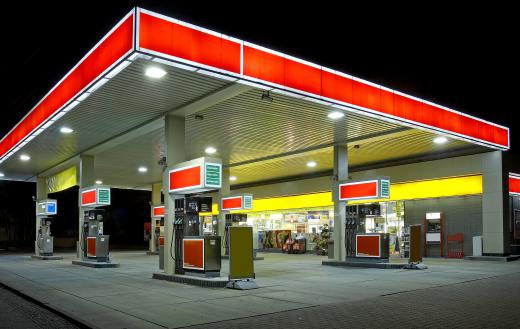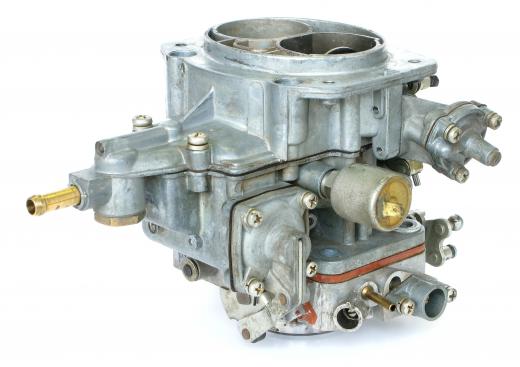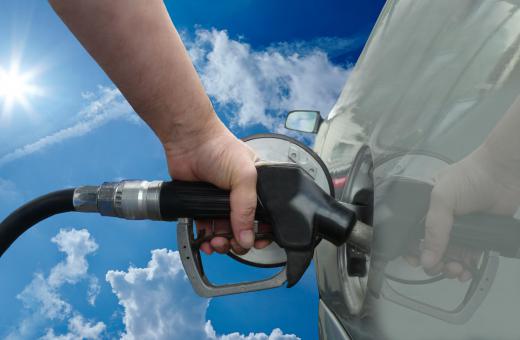What are the Different Types of Octane Gas?
Octane gas comes in several different grades, with each number on the grade representing the resistance to burn the fuel has. The higher the octane rating, the slower the ignition or burn. The most basic form of octane gas on the mass market in the United States is 87 octane. Most gasoline stations in the US will offer octane ratings at different levels ranging from 87 to 92. Individual pumps will usually offer at least two octanes, with some offering as many as five.
Stated simply, octane is a refined fuel with eight carbon atoms chained together. This fuel is more stable than other types, and therefore is able to be used in internal combustion engines. An 87 octane fuel normally means it is comprised of 87 percent octane, and 13 percent of some other fuel type. That other fuel type could be hexane, which is six carbon atoms chained together.

Theoretically, it is not possible to achieve more than a 100 octane fuel, but there are boosters and refining capabilities that make fuel even more stable. Such gasoline may be given a rating higher than 100 octane. This is not truly a statement of the octane but rather an equivalency rating demonstrating how stable the fuel is.
The purpose of the octane rating is to show how much of the fuel can be compressed before it ignites. A fuel with a rating of 92 octane will require more compression than a fuel with an octane rating of 87. Certain types of engines may have higher compression ratios and, as a consequence, will require a more stable fuel. Octane and fuel stability share a direct correlation.

Many vehicles use an 87 octane gas without any problems, especially those with fuel injection. For cars sold in the US, most manufacturers design engines for 87 octane and will recommend that grade. This octane will also be the cheapest most of the time. Using a higher octane will not cause any harm to a vehicle, but may offer no benefit either.
In some cases, a higher octane gas may cost less than a lower octane gas, at least for the consumer. Some additives, such as ethanol, may be included in a higher octane gas. Tax subsidies for the ethanol fuel may actually make it cheaper to use, even though the octane may be higher. Those using ethanol may get a break at the gas station, but will find their gas mileage is reduced because ethanol does not burn as efficiently as fossil fuels.

Generally, the only time a higher octane gas may be needed is when the vehicle has a high performance engine. Cars that are advertised as being turbo charged, for example, may require a higher octane of fuel. Using a lower octane gas could cause knocking in the engine or poorer performance. Drivers who are unsure what octane they should be using should check the owner's manual of their vehicle. Older vehicles, or equipment with carburetors, may also require a higher octane.
AS FEATURED ON:
AS FEATURED ON:













Discussion Comments
I was always told that I should buy the high octane gas occasionally just to clean out my engine. I have since learned that this is not so. The high octane gas doesn't have any magical cleaning powers. Now, I just buy one of those containers of fuel additive that are supposed to clean the engine. I can't say for certain that these work, but they don't do any harm, and maybe they are helping a little.
@mobilian33 - I think your car was one of the rare exceptions. As this article says, the average car or truck doesn't benefit from the higher octane rating. Many drivers are so convinced that anything that costs more has to better that they spend the extra 10 or 20 cents per gallon of gas on the higher octane. This really is a waste of money.
I had an old Chevrolet back in the nineteen eighties. My brother gave me the car. It was one he had bought and brought back to life. When I would drive the car, the engine would knock and the car would jerk like maybe the gas was running out or the fuel line was blocked. This didn't happen all of the time, but the car didn't run smoothly in general.
I didn't want to say anything to my brother since he had given me the car and didn't charge me a penny for it, or for the work he did repairing the car. I didn't want him to think I was complaining. One day I let it slip that the car was running poorly, and my brother told me to use the premium gasoline instead of the cheaper stuff.
I did this the next time I filled the tank, and I noticed a little difference. I did this a second time and the car was totally different. It ran like it was brand new. I was surprised at just how much of a difference higher octane gas could make. I always thought there was no real difference in one grade of gas and the next.
Post your comments